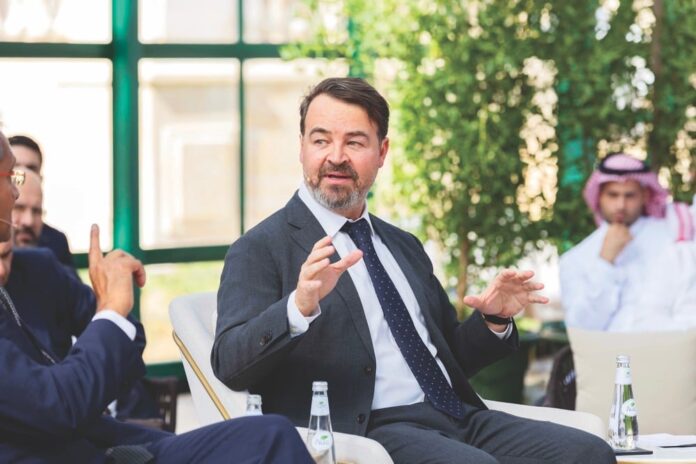RIYADH: Saudi Arabia’s Public Investment Fund (PIF) is actively supporting the Kingdom’s 10-year plan to create about 1.8 million jobs, an official for the fund said on Thursday.
Speaking to Arab News on the sidelines of the Future Investment Initiative forum in Riyadh, Jerry Todd, managing director of the PIF’s National Development Division, estimated that up to 400,000 of these jobs will not require a college degree.
Instead, many of the new roles will require strong vocational training and apprenticeships to meet the Kingdom’s development challenges. “These big problems require multiple forms of solution,” said Todd.
Many international firms are already creating opportunities for young Saudis without prompting by the PIF or the Saudi government.
“At the level of companies, they’ve already set up internship programs. Lucid Motors, for example, sends batches of Saudi engineers to their facilities in the US for training and some of those end up becoming full-time employees,” said Todd.
“And that’s a Lucid decision. That’s not pushed by the Saudi government or PIF. It’s because the talent is there, they just need to be given the opportunity,” he added.
The PIF has a dual mandate: To invest for return, but also to help enable Vision 2030, the Kingdom’s social and economic reform agenda aimed at diversifying the economy away from oil, and promoting a young and diverse workforce.
“So if you think of Vision 2030 as a strategy for how an economy transitions from less complex to more complex, with more job creation, more local value, add more diversification. Then the PIF is in a way, one of the engines to help drive that diversification, drive that transition,” said Todd.
“And we do that in sectors through companies. So we — at our heart — are an investor and owner of operating businesses. And it is the growth of those businesses in new sectors and their efforts to create local supply chains, and to develop a local workforce, that creates that more complex economy going forward,” he added.
The PIF has 13 priority sectors, some of which are quite advanced today, such as financial services.
“The banking system in Saudi Arabia is one of the strongest in the world. At the other extreme, we have automotive, which is a brand new sector. In each of those, there’s more that can be done,” said Todd.
“So if you think about the spectrum of a sector from non-existent to import-oriented all the way through to globally competitive export-focused businesses, that path, every step you move to the right adds value in the economy because itadds complexity.
“What that complexity means is that the money that gets spent bounces around in the economy more. In an import business, it only bounces once you have supplies come in. You sell to local customers, you pay the international suppliers. There’s no value added.
“So we want as many of those internals bouncing around if you will, as possible. This is not a PIF idea.
“These are parts of a broader effort to have a broad economy, meaning relevant in many sectors, and the deep economy, meaning that within each of those sectors, the money bounces around as much as possible.”

